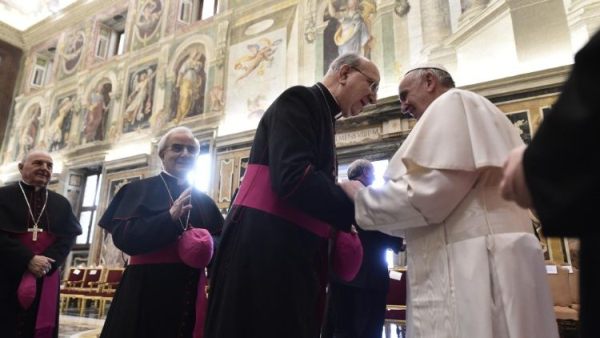Academic conference set to explore history of Roman Curia
 An academic conference taking place in Rome on 26-28 May looks at the history of the Roman Curia, with the aim of providing “a broad historical overview that will offer a window into the lived history of the central administration of the Catholic Church. In this interview with Vatican Radio, Dr Donald Prudlo looks discusses the history of the Roman Curia and its relevance today.
An academic conference taking place in Rome on 26-28 May looks at the history of the Roman Curia, with the aim of providing “a broad historical overview that will offer a window into the lived history of the central administration of the Catholic Church. In this interview with Vatican Radio, Dr Donald Prudlo looks discusses the history of the Roman Curia and its relevance today.
As Pope Francis brings the Roman Curia into the 21st century with a wave of reforms – including the recently promulgated Apostolic Constitution Praedicate evangelium – a group of academics is gathering in Rome for a conference that will examine the history of the Church’s central administrative body.
The Roman Curia Conference, being held at the Augustinian Patristic Institute from 26-28 May, features scholars from around the world, and will focus on “The Historical Outlines and Contexts of the Roman Curia.”
Serving a global and globalized Church
“The Roman Curia is the oldest extant administrative body in the world,” says Dr Donald Prudlo, who holds the Warren Chair of Catholic Studies at the University of Tulsa, and is one of the organizers of the conference. “Further, and so important today, the Roman Curia is the first administrative body of a truly global institution.”
In light of Pope Francis’ ongoing reform of the Curia – and especially with the promulgation of Praedicate evangelium, which goes into effect shortly after the conclusion of the Conference, Dr Prudlo says it is especially useful “to reflect back on the long history and many instances of reform in the history of the Curia, which is an enduring, influential, and sometimes misunderstood body.”
Returning to the origins of the Curia
The Roman Curia exists for the service of the Church, Dr Prudlo insists, “and the more that we can harken back to what its roots were, what the original mission of the Curia offices was, the better that those who are responsible for reforming the Curia today will be able to understand and to serve their mission in a better way.”
This week’s conference will include presentations on the origins of the Papal Curia, the development of Curial institutions in the medieval and Post-Tridentine eras, and Papal finances in the Early Modern Period, among others.
Dr Prudlo, who will deliver an address on the Roman Curia and the New Orders in the Thirteenth Century, will also be presenting a new English translation of St. Bartholomew of the Martyr’s book of advice to bishops after the Council of Trent, entitled Stimulus Pastorum. An exceptionally influential work in its time, Stimulus Pastorum served to guide the development of the episcopate in the post-Tridentine period.
The conference is free and open to the public, though registration is requested at https://storiadellacuria.org. Papers will be given in English and Italian, and simultaneous translation will be available.
In this wide-ranging interview with Christopher Wells, Dr Donald Prudlo talks about the history of the Roman Curia; its relevance today; the relationship between the Curia, the Pope, and the Bishops; Curial reform; and the role of the Curia in a Synodal Church:
Christopher Wells
Source: vaticannews.va

